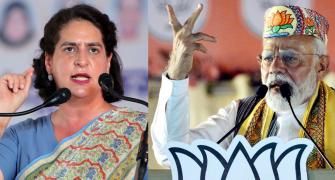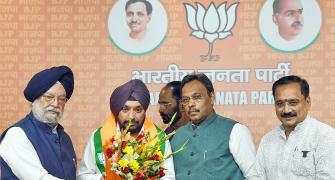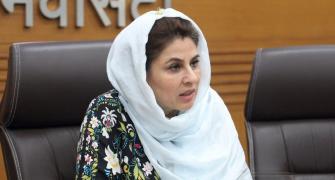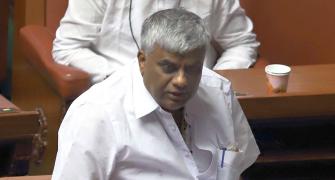Addressing top armed forces commanders in New Delhi, the Prime Minister said India had to be "mindful" of the desire of extra-regional powers to keep it engaged in low-intensity conflicts and local problems "to weigh us down in a low-level equilibrium".
Observing that the world community had failed to ensure "effective, rule-based order" to address threats like terrorism and proliferation of weapons of mass destruction, Prime Minister Manmohan Singh on Thursday said India has to evolve a "new paradigm" of security cooperation relevant to the emerging multi-polar world.
Asserting that global threats like terrorism require global response, he said globalisation had "sharpened the threat posed to us by instability in both our immediate and our proximate neighbourhood".
To meet these challenges, New Delhi would have to adopt a strategy based on "three pillars" - strengthen itself economically and technologically, acquire adequate defence capability and to seek partnership on strategic, economic and technological fronts.
" the international community has made some progress in evolving a rule-based order for managing the economic and commercial dimensions of globalisation," he said.
He, however, noted, "The absence of an effective, rule-based order is acutely felt in addressing contemporary security threats, such as terrorism and proliferation of WMDs."
While talking about threats posed by terrorism, the prime minister said it was in India's security interest to ensure that its neighbours evolve as viable states with moderate and stable political and social environment and a robust economy.
Noting that there was a role for diplomacy and for civil society to influence this process, Singh said, "Political pluralism and moderation can stabilise our security environment."
He said south Asia " must be home to open societies and open economies. That is in our interest and in the interests of all countries " of the region.
Touching on the new global order, he said the United States is today the dominant economic, military, technological and cultural power.
He said, however, that India, along with the European Union, Russia, China and Japan is anticipated to consolidate their individual positions to play a global role.
Noting that India sought to evolve a new paradigm of security cooperation relevant to an emerging multi-polar world in which global threats obtain global responses, he said New Delhi had entered into strategic partnerships with the US, Russia, Japan and the European Union and are pursuing strategic cooperation with China.
"Today, nations are engaged simultaneously in competition and cooperation," he said.
Emphasising that India had to widen "policy and developmental options", the prime minister said with this perspective, New Delhi was reciprocating positively to overtures of other major players in the global balance of power.
"No doubt this involves sophisticated bargaining with each of them", and that "It is unrealistic to expect nations to act for altruistic reasons international relations are in the final analysis power relations".
Singh said India had to learn to deal with this new reality and plan long-term security based on a proper appreciation of the evolving trends.
"We should develop friendly-interactive relations with as many major powers as possible". Asserting the UPA Government's commitment never to shy away from finding funds for the country's defence requirements, he said for this the nation would have to boost efforts to step up the rate of economic growth.
"If our economy grows at 8 per cent per annum", the prime minister said it would not be difficult to allocate about three per cent of the GDP for national defence.
He cautioned that critical effort to generate faster economic growth was the assurance of energy security. This would require a broad-based energy policy based on rational economic and strategic considerations.
"Rational domestic-pricing policies, financing of long-term investments, diversification of sources of energy and ensuring security of sea-lanes was primary to this," the prime minister said.







